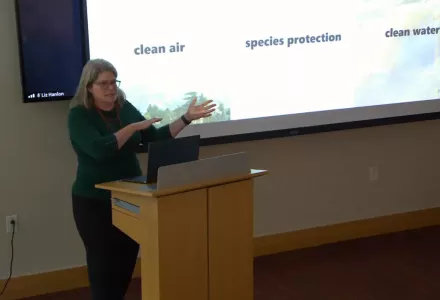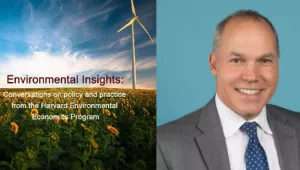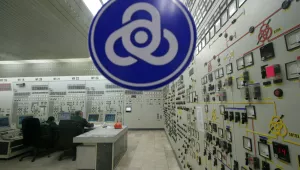
One of the major factors affecting the speed of the ongoing energy transition is the process for obtaining federal permits for building new clean energy infrastructure. According to some estimates, the United States needs to increase the deployment of renewable energy by 2-3 times the current rate to meet the Biden Administration’s decarbonization goals. However, the permitting process can often slow deployment significantly—between 2010 and 2017, a federal study found that major projects could take four years or longer to receive the necessary environmental permits required under the National Environmental Protection Act (NEPA) of 1970.
Two weeks before Senate Republicans introduced a new bill to amend NEPA to remove several protections that would speed permitting of energy projects, Harvard Kennedy School’s Energy Policy Seminar series hosted Ana Unruh Cohen, Senior Director for NEPA, Infrastructure and Clean Energy at the White House Council on Environmental Quality (CEQ), to provide an update on the Biden Administration’s ongoing permitting reform.
Although both sides of the aisle are calling for changes to the permitting process, the Administration wants to streamline permitting while also promoting environmental justice and safeguarding community review, which remains one of the lengthiest parts of the review process. Acknowledging the tension, Unruh Cohen began by confirming that the Biden Administration recognizes the permitting challenge as a major impediment to its climate goals and has taken several steps to reduce the approvals timeline. While NEPA was “forward-thinking in 1969,” Unruh Cohen noted that it is now “obviously outdated” and in need of reform.
The Administration has taken a number of steps to address this issue, including amendments to the FAST-41 legislation (Fixing America’s Surface Transportation Act) embedded in the 2021 Bipartisan Infrastructure Law that reforms the federal environmental review and permitting process. The 2022 Inflation Reduction Act (IRA) included funding for the Federal Permitting Improvement Steering Committee (created under FAST-41) and for what Cohen called “timely, robust, transparent, and efficient environmental reviews.” The Biden Administration’s Permitting Action Plan, released in 2022, identifies priority areas to improve permitting, including through coordinating across agencies, adequately resourcing agencies, engaging affected communities early, and demonstrating agency accountability.
The Fiscal Responsibility Act, passed in June of this year, made additional amendments to NEPA. Cohen has led the CEQ in preparing a list of proposed rulemaking changes including clarifications to the different requirements and levels of NEPA review, the roles and responsibilities of “lead” vs. cooperating agencies, setting page limits and deadlines for environmental assessments, and more.
Despite these efforts to streamline permitting to support a speedier energy transition, Cohen emphasized that the proposed rules do not sacrifice thoroughness for speed or weaken NEPA’s mission on environmental regulation. The new rules encourage agencies to consider long-term climate benefits as well as near-term impacts in their review and to really “lean into public engagement,” believing that early engagement can serve to prevent litigation and save time later in the process. The new rules would require agencies to designate a Chief Public Engagement Officer responsible for facilitating community engagement across the agency and standardize language used in environmental impact assessments so that it is easier for the public to engage with it. In this way, Cohen stressed, the Administration is sensitive to the needs of local communities and “making that a focus.”
A key element of that focus is on promoting environmental justice and ensuring that a portion of the benefits of new energy projects flow to the local community (a principle known as Justice40) and that community impact is evaluated as part of the permitting process. Biden’s Executive Order 14096 on “Revitalizing Our Nation's Commitment to Environmental Justice for All” includes specific language calling for incorporating environmental justice concerns into NEPA reviews. The Bipartisan Infrastructure Law also includes direct funding for capacity building for local communities to support their ability to participate in these reviews.
However, as several attendees noted in the session, impacts or benefits to local communities are hard to measure and track in the context of these massive investments in new infrastructure. While one measure of community satisfaction or buy-in for these changes might be a reduction in lawsuits brought against energy projects, Cohen noted that this is an imperfect measure and the government is grappling with this challenge. Ending with a call to action, Cohen reflected that the government is open to “smart folks at Harvard” to help come up with thoughtful solutions.
Matt Floyd is a joint MBA/MPP degree candidate and a Research Assistant with the Belfer Center's Environment and Natural Resources Program, focusing on the intersection of decarbonization, economic development, and security.
Watch the event recording below.
Floyd, Matt. “Event Debrief: Permitting Progress in Support of U.S. Clean Energy and Climate Goals.” Environment and Natural Resources Program, Belfer Center, November 8, 2023





